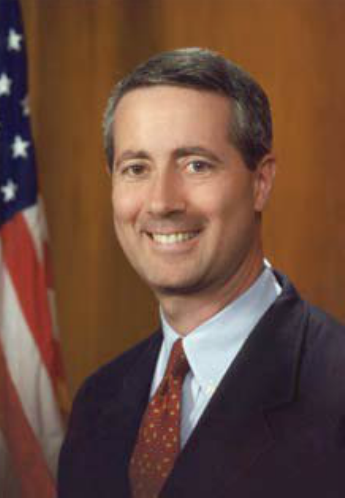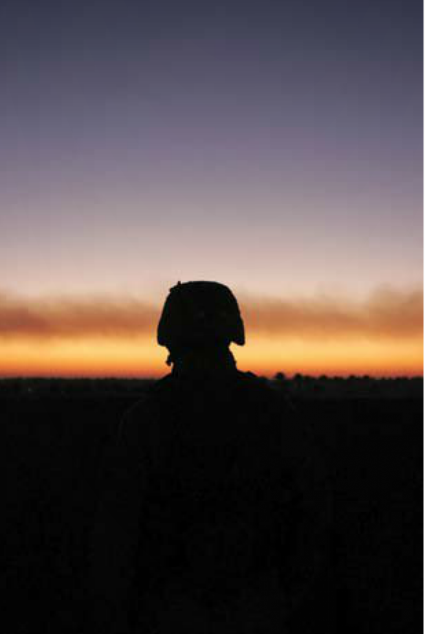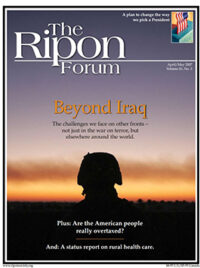
As we enter the fifth year in Iraq, the debate in Congress and focus around America is on the new strategy to help the Iraqi government provide security and stabilize the country.
Success in Iraq is important, but I also believe we are being shortsighted if we continue to focus all of our attention on the headlines of the hour and the developments of the day. We cannot know for sure what dangers lay ahead.
We must prepare for uncertainty and for a future defined by a simple fact– the fact that the world is changing faster than we are adapting. Perhaps former General Electric Chairman Jack Welch put it best when he said: “When the rate of change inside an institution becomes slower than the rate of change outside, the end is in sight. The only question is when.”
Mr. Welch was referring to private companies trying to compete in the international business world when he made these comments. But he could have been talking about the U.S. government trying to survive in the post-Cold War world. Indeed, the world has changed a truly staggering amount since the fall of the Berlin Wall. Yet, it would be hard to argue that America’s foreign policy apparatus has changed as rapidly or as much.
The 9/11 Commission said as much in their report on the 2001 terrorist attacks. The Commission found “failures of imagination, policy, capabilities, and management,” but “[t]he most important failure was one of imagination.” In short, the Commission found that the U.S. looked at the world and our potential enemies from a narrow perspective, not understating that the combination of technology and a radical ideology posed a new and dangerous threat.
The September 11th terrorist attacks were a wake-up call for our Nation. Unfortunately, we keep hitting the snooze alarm on the changes that need to be made to keep our Nation secure.
What are these changes? First, we need to update our own government organizations to be more flexible and effective. Secondly, we need to place greater emphasis on how and what we communicate with the outside world. Finally, we need to promote connectivity, particularly in those parts of the world that are isolated and thus dangerous.
Fielding a Full Team

We must start with ourselves. Achieving our goals in a complex, rapidly changing world depends on more than military power. America must field a full team of players with a wide range of deployable capabilities – and that team must work together.
In Iraq, for example, we have had to rely on our military to do just about everything – from repairing the sewers to developing a justice system to advising farmers. Just this February, Secretary Rice announced that nearly half of some 300 new State Department positions in Iraq would have to be filled by military personnel. Clearly, the military is an essential tool to help achieve our national objectives. But it is not the right one to answer all of the challenges we face on the global stage. If the military is the only federal organization that can perform when called upon, we may be in danger of living out the old saying, “If all you have is a hammer, every problem looks like a nail.” In addition, the stresses on the Armed Services will grow, and despite their best efforts, America will not be as successful as we need to be.
While most of us acknowledge the importance of diplomacy and economic assistance, we have not approached the need to modernize the State Department or the U.S. Agency for International Development with the same urgency as modernizing the military. One wonders whether the resistance to change is stronger in those institutions or whether policymakers are guilty of the “soft bigotry of low expectations” in more places than just our schools. In any event, reforms that create modern, effective organizations are essential.
There are certainly competent, knowledgeable Americans working in all government agencies, but too many of those agencies cannot get the right person in the right job at the right time. We need an Expeditionary Corps that stands ready to spread technical assistance, establish the foundations of functional democracy, and provide guidance in building civil society. We need lawyers and judges to help form legal systems and draft constitutions. We need experts to improve farming practices and nutrition. We need people to help foster educational systems, to build infrastructure, to invigorate private enterprise, and to deal with public health issues. If the Departments of Justice, Agriculture, Education, Transportation, Commerce, and Health and Human Services cannot get experts in place in a timely manner, we will need a dramatically bigger State Department or Defense Department or some other way to deliver this assistance.
If the military is the only federal organization that can perform when called upon, we may be in danger of living out the old saying, “If all you have is a hammer, every problem looks like a nail.”
Frustration with the failure of government organizations to meet new challenges and to work together has brought some reorganization since 9/11, such as the creation of the Department of Homeland Security and a Director of National Intelligence. But we cannot put all of our foreign policy organizations into one massive Department. Instead, government agencies must work together to achieve our national security goals.
Unfortunately, what currently passes for interagency coordination these days consists primarily of a lot of meetings in Washington that may or may not produce decisions or result in action. In the field, capable, well meaning individuals make the best of the situation. It should not be so difficult.
The National Security Act of 19 7, which created the current National Security Council structure, was designed in the Industrial Age to counter the hierarchical Soviet Union. This year the Act turns 60 years old, and we should not expect this structure of another time to fit automatically in the Internet Age and its diversity of threats.
One promising step for reform is a cooperative effort under the auspices of the Center for the Study of the Presidency to draft proposed revisions to the 1947 Act that would update organizations and processes and enable greater interagency cooperation. Any such effort, however, will need a big push to get through a turf-conscious Congress in time for the next Administration. And, as past efforts to reform Homeland Security and Intelligence agencies remind us, organizational reform is just the beginning. Changes in culture are also required if organizational changes are going to last.
Future presidents will have to make use of all forms of national power and influence. Like an accomplished maestro of a symphony orchestra, the Chief Executive must be able to call for just the right sound at the right time. But to do so, he must have organizations that know how to play their instruments and are willing to play them together.
Strategic Communications
The long, ideological struggle with radical Islamic terrorists must be waged on many fronts, including military, diplomatic, and economic. One critical aspect of this war is what can best be labeled as “strategic communication.” Strategic communication is not marketing; it is not simplistic slogans; it is not simply looking for better ways to convince the world of how good we are. Strategic communication is much deeper and more sophisticated than that. It is a holistic approach to how we communicate with – and thus relate to – the rest of the world.
Strategic communication encompasses public diplomacy, public affairs, international broadcasting, and information operations. It must, of course, make the most of ever-evolving technologies, but the primary focus should be on effectiveness with the target population. As with all successful communication efforts, strategic communication must begin with listening and understanding. We cannot conduct a public opinion poll or two and assume we know what the people think. True understanding goes much deeper, and requires examining history, culture, language, traditions, values, and anxieties. It must extend to networks of influence within societies and the factors that influence human behavior. Without starting from a place of understanding, any attempt at communicating, much less influencing, will prove futile.
It is worth emphasizing that we need to have this kind of deep, comprehensive understanding before making any significant policy decisions. More than five years after the attacks of 9/11, we still do not fully understand our adversary – what his hierarchy of values is, how to influence his decisions, and especially how to dissuade those tempted to join the fight against us. Some very good work has led to pockets of understanding, but there is not the broad appreciation of our enemy’s values and motivations that is needed. Also, what we do know has not always made its way into policy decisions.
In addition to understanding attitudes and cultures, strategic communication involves engaging in a dialogue of ideas, advising policymakers of the implications of various decisions, and developing and implementing communication strategies that can help shape global attitudes and behaviors. It involves the work of the Department of State, the Department of Defense, the Intelligence Community, and others.
Needless to say, strategic communication is a massive job that is a crucial aspect of U.S. national security for generations to come. Presently, we do not give it the attention or resources it deserves, and what attention it does get is more superficial than strategic. Government does not have all of the answers or all of the expertise needed to successfully wage the communications war. Success will require a cooperative partnership between government and the private sector.
To facilitate this cooperation, we should create a non-partisan, non-profit Center for Strategic Communication to be at the intersection of public and private sector efforts. As a non-governmental entity, the Center can take advantage of the experience and expertise of those outside of government who may be unwilling or unable to work within government but have much to contribute. Outside of official bureaucracy, it would also allow greater flexibility than a government institution.
Of course, the long war against radical Islamic terrorists is about much more than communications strategies. It is also about policies and actions, some of which will not meet worldwide popularity. Policy and strategic communication cannot be separated, but effective communication remains an essential part of any effort to make the world a safer place. As a Defense Science Board report issued in September 2004 noted: “Strategic communication is a vital component of U.S. national security. It is in crisis, and it must be transformed with a strength of purpose that matches our commitment to diplomacy, defense, intelligence, law enforcement, and homeland security.”
Global Connectivity
In his thought-provoking book, “The Pentagon’s New Map,” Thomas P.M. Barnett argues that in today’s world “disconnectedness defines danger.” More connectivity with the rest of the world reduces the prospect of terrorism, war, and violence. If that is true – and a good case can be made that it is – a fundamental policy objective of the United States should be to promote connectedness.
Of course, an Internet connection or a satellite dish is not a panacea. Some young Muslims in Europe are “connected” in this way but still feel isolated, hopeless, or, as a French official recently wrote, humiliated. Moreover, awareness that others have higher standards of living may fuel resentment, envy, and fear. A major part of al Qaeda’s recruitment strategy plays upon fears that globalization will bring Westernization, overcoming traditional ways. But the fact remains that those with a personal stake in the global system are less likely to want to destroy it, and connectivity can give rise to hope, as well.
We must be prepared to fight and win political and ideological struggles, not just military conflicts.
Severely repressive regimes can maintain power only when they isolate their people from the outside world. The North Korean regime, for example, cannot survive if the people see how their neighbors to the South live. And so Kim Jong-Il enforces strict control of information and media to ensure that his people are kept blind to the relative depression of their own situation. China, on the other hand, is attempting to delicately balance the connectivity required for economic freedom with maintaining political control. My money is on freedom to prevail.
We need a national strategy to promote openness and connectedness throughout the world. We should advocate unfiltered access to the Internet and fund alternative news sources for those countries that do not have them. We should use all of our resources to help knock down barriers to free information exchange. We should continue to push for more trade, encourage travel, and promote foreign investment. As the flow of information, people, goods, and capital across borders increases, terrorism and violence are sure to decrease.
Conclusion
Navigating successfully through the treacherous waters ahead requires change from within. We must be able to deploy a full force of integrated agencies that work together effectively. We must proceed with a sophisticated understanding of the motivations and global networks that drive our world as we develop credible messages and communicate them effectively. We must work to reduce barriers and promote global connectedness.
We must be prepared to fight and win political and ideological struggles, not just military conflicts. And as we utilize the full spectrum of American influence – from diplomatic to economic to military – we cannot underestimate the importance of international partnerships. Moral authority and persuasive diplomacy will be worth as much as firepower and armor in many situations, and allies can help us be successful.
And as we utilize the full spectrum of American influence – from diplomatic to economic to military – we cannot underestimate the importance of international partnerships.
For two centuries, imagination and innovation have made America great. Now, as the world’s only superpower, it is important that we maintain our ability to imagine and innovate and also revitalize our governmental structure. With a foreign policy apparatus that is flexible and effective, we will be able to adapt to global changes as we face the challenges of our day and rise to the opportunities that the future presents.
But we must act now.
Mac Thornberry represents the 13th District of Texas in the U.S. House of Representatives. He serves on the Intelligence Committee and is Ranking Republican of the Armed Services Subcommittee on Terrorism, Unconventional Threats and Capabilities.




